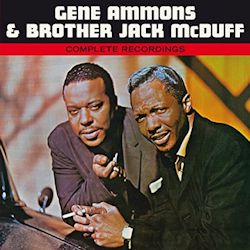CD1
Twisting The Jug
1. Twisting The Jug
2. Born To Be Blue
3. Satin Doll
4. Moten Swing
5. Stormy Monday Blues
6. Down The Line
Gene Ammons - Tenor sax
Brother Jack McDuff - Organ
Joe Newman - Trumpet
Wendell Marshall - Bass
Walter Perkins - Drums
Ray Barretto - Conga
Soul Summit
7. Tubby
8. Dumplin’
9. When I Wish Upon A Star
10. Shuffle Twist
11. Sleepin’ Susan
12. Out In The Cold Again
Gene Ammons - Tenor sax
Brother Jack McDuff - Organ
Sonny Stitt - Tenor sax
Charlie Persip - Drums
CD2
Brother Jack Meets The Boss
1. Watch Out
2. Strollin’
3. Mellow Gravy
4. Christopher Columbus
5. Buzzin’ Around
6. Mr. Clean
7. Ballad For Baby
Gene Ammons - Tenor sax
Brother Jack McDuff - Organ
Harold Vick - Tenor sax
Eddie Diehl - Guitar
Joe Dukes - Drums
Bonus Tracks
Soul Summit Vol.2
8. Scram
Personnel as prec.
Gene Ammons Quartet
9. The Party’s Over
10. Soft Winds
11. Lascivious
Gene Ammons - Tenor sax
Patti Bown - Piano
George Duvivier - Bass
Walter Perkins - Drums
While the 1960s may not have delivered the same plethora of fine recordings as the 1950s, nevertheless there were many outings that caught the spirit of
the moment. Although his personal life was a mess due to drug offences, prison terms, and eventually an early death due to cancer, Gene Ammons had a
significant influence on a generation of big-toned tenor saxophonists. Organist Brother Jack McDuff was a groove-minded player who had an irrepressible
approach to the Hammond B-3 and when paired with Ammons, they formed a compelling combination. These sessions, which were originally done for Prestige
Records in the early 60s, are a testament to their cohesiveness.
Twisting The Jug
has no connection to that better to be forgotten dance craze called “the twist”. Rather, it is a swinging jazz album, with the addition of one of Count
Basie’s key sidemen, trumpeter Joe Newman. Ammons sets the pace with the opening title tune which is a jumper, with Ray Barretto’s conga laying down a
solid beat, that allows all the players to show their stuff. On Born To Be Blue, the Mel Tormé/Robert Wells ballad, Ammons opens with a wistful
solo, followed by Newman on muted trumpet showing a soft dark effect. Both players continue along the same line throughout the balance of the number. Satin Doll gets into a solid groove right from the start with McDuff’s HB-3 setting the atmosphere upon which both Ammons and Newman lay down
strong solos. Stormy Monday Blues opens with a low-down blues line from organist McDuff, which is picked up by Ammons’ soulful tenor, supported by
Newman’s muted trumpet offering accents in the background.
Soul Summit
brings Sonny Stitt into the mix, so there are two tenor voices which adds an interesting dynamic to the session. Stitt was initially known for his alto
playing which begat some unfavourable comparisons to Charlie Parker. Consequently Stitt started to play tenor sax, in order to avoid the notion that he
copied Parker’s style. On this recording, it is clear that Ammons and Stitt were musically compatible. Starting with “Tubby” which is an Ammons composition
in 6/8 time, the two exchange solos with Ammons first out of the gate, and he is then followed by Stitt. While it may be difficult to tell them apart, a
careful listening can underscore their differences. Ammons' tone is rounder, deeper and fuller ,while Stitt has a more glossy and tighter sound. So
regardless who takes the lead in the composition, whether it is the swinging When I Wish Upon A Star or the expressive ballad Out In The Cold Again, the captivating and self-assured style of these two talents makes for a commanding session. Finally in the liner notes Gene
Ammons is incorrectly shown as being out on tracks 10-12. Clearly the producers hadn’t listened to the album.
Brother Jack MacDuff Meets The Boss
completes the trio of recordings by this pairing. It is an expanded band with the addition of Harold Vick on tenor sax (who is no Sonny Stitt) and Eddie
Diehl on guitar. It is a sassy group that swings, and the expanded voicing of the two tenors and guitar gives the group a strongly solidified sound. Horace
Silver’s Strollin’ is a fine example of that construct as each member takes advantage of the structure of the theme to extend their solo
range. Christopher Columbus, which was the foundation for the Benny Goodman hit Sing, Sing, Sing, is given a tour-de-force workout with
McDuff particularly effective, as he ranges over the keyboard with intensity. Before going on to the final tracks of this disc, there is another error to
point out in the liner notes, but which has been corrected in this review. Scram is listed as a bonus track from a session with Gene Ammons
heading a quartet with the pianist Patti Bown. Scram is, in fact, from the album Soul Summit Vol 2., and has the same band as shown for Brother Jack McDuff Meets The Boss. The last three tracks on this disc are a quartet session that is quite delightful. In addition to Ammons, who
is in fine Coleman Hawkins style form, pianist Patti Bown is a surprise as she plays with confidence and curiosity in a limited supporting capacity.
Combining Gene Ammons’ authoritative tenor sax with Brother Jack McDuff’s swaggering organ, the result is an energetic and welcoming version of jazz.
Pierre Giroux
